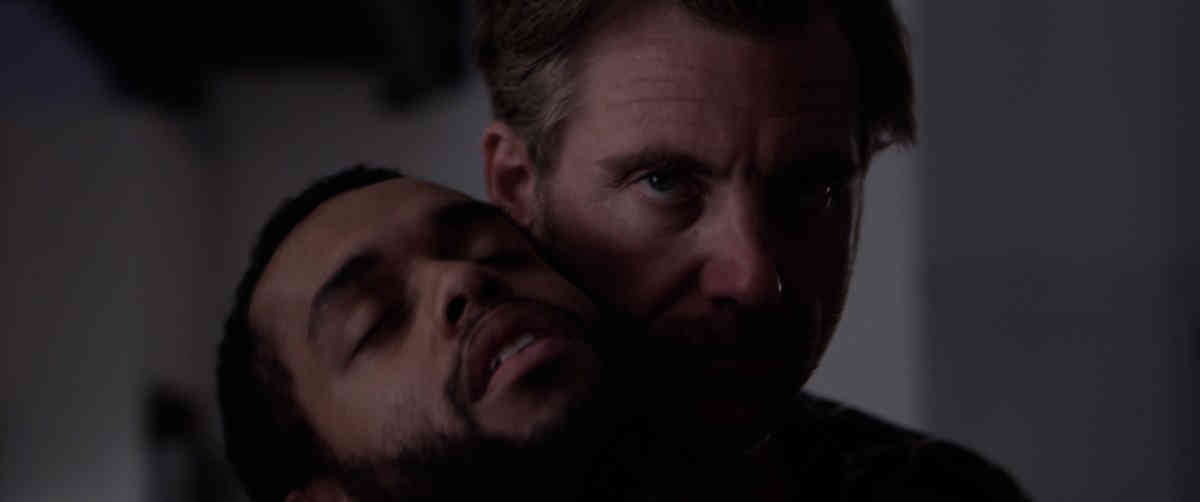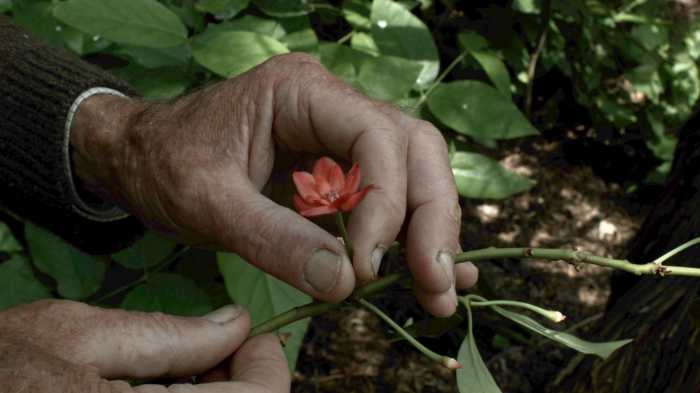The twisted queer thriller “The Skin of the Teeth” opens with John (Donal Brophy), who is white, preparing for a date with Josef (Pascal Arquimedes), a younger, cute, and slightly insecure African-American man. When Josef arrives, the guys drink a little wine, eat a little food, and have a deep though awkward chat. Later, the two take a pill, dance a little, and then… well, it’s best to let viewers experience what happens next.
Writer/ director Matthew Wollin’s film, an intense, provocative little drama — it could work very well as a stage play — keeps one of the characters and most of the audience guessing about what is going on. But puzzling things out is what makes “The Skin of the Teeth” so intriguing. As characters assume multiple roles, questions about identity are raised. Wollin addresses themes of truth and trust, race and sexuality as one character encounters what might best be described as a surreal nightmare — if that isn’t too much of a spoiler.
The filmmaker chatted via Skype with Gay City News about his curious film.
GARY M. KRAMER: For an icebreaker, I thought I would ask you one of the inappropriate questions one of the characters in the film poses: Are you a top?
MATTHEW WOLLIN: [Laughs] No one has asked me that before! Can I defer that question?
KRAMER: The evening between John and Josef can be described as awkward. What prompted you to depict their date in this way?
WOLLIN: I spent a lot of time trying to figure out the right dynamic between the characters. In earlier drafts, they were meeting for the first time — or farther along in their relationship. I deliberately settled on a turning point so there was this slightly-charged awkwardness. I spent time finessing that because it’s difficult to depict awkwardness. I refined the dialogue and made sure there were specific moments where the relationship shifted.
KRAMER: The guys talk about power and being open, and embarrassment about being affectionate in public. What observations do you have about this idea of protecting or expressing who you are?
WOLLIN The narrative hook is to start in a way that you have just enough info to determine some things but not enough to fill in all the gaps. You have a grasp of who they are, but the narrative progression makes you think it’s going in one direction — then it branches off. To talk about the openness and power is to talk about the stability and mutability of identity and that decision to live openly or keep part of yourself to yourself. That’s been on my mind as a gay man coming of age, and this idea of how you figure out who you are and sorting out how people perceive you and what you like or don’t like. That’s especially complicated for marginalized communities. So, it’s how one’s sense of identity gets deconstructed and how one builds an identity.
KRAMER: You play with the characters and the audience, creating a sense of unreality in a very real — and very intense — situation. Can you discuss your purpose for this approach to the material?
WOLLIN: With respect to the surreality, I went in knowing I wanted to make a film that had weird things going on. I love non-real movies. I was looking for a way to put that in the narrative and build it in a way without weird special effects. The trick is to keep a hard grasp on how much strangeness was going on for the characters and the audience. Anytime you play with fantastical things, it can get away from you. The film is never totally real or unreal.
KRAMER: I love that you take ordinary things — Scrabble, masks, dental floss — and make them ominous and surreal. Can you describe your thought process for that?
WOLLIN: With the choice of surreal things, they do have significance and have signposts back to things that happened, and that’s helpful to read the film and how real or unreal it is. They are not completely random. It’s not hard to make an ordinary thing seem weird. I like doing that. It’s super fun. So, for the floss — move a normal object to a different room in a different time of day. When cinema goes for surrealism, they go for special effects and I wanted to make it subtle and literalize it in the world. You don’t have to go too far to see how strange and weird the world is. A dark hallway can look like the strangest thing you’ve ever seen in your life. I had fun finding low-key ways of making it very bizarre.
KRAMER: The film addresses themes of truth and trust — how we adjust ourselves to answer a question in a way that we say the truth, what we think they want to hear, or what we think is the best answer in that situation. What are your thoughts about this?
WOLLIN: It’s hard for me to understand what someone’s true self is. Asking how people express who they are when there are different forces at work — how do we know who they are at a core level? It’s you perceiving you, and how you perceive how they perceive you. How you think of yourself is more contextual than it really is. As soon as a situation changes, it’s easy to change how you are. Perhaps that’s just how I am. When I am unsure, I tend to get overly confident about what I’m saying. You can see that in the film in how people react to uncertainty.
KRAMER: Are you making a statement about how we find coping mechanisms to deal with stressful situations?
WOLLIN: I hadn’t thought of it in terms of coping. There’s a moment in the date when Josef pries into John’s partying and drug history. He imagines something he doesn’t know about and he thinks he wants that. It’s not an accurate representation, but it’s easy to commit those fallacies about things in the world: it will make me feel different or grow as a person. He’s being a different person or a fuller version of himself.
THE SKIN OF THE TEETH | Directed by Matthew Wollin | TLA Releasing | Opens May 10 | Cinema Village, 22 E. 12th St.; cinemavillage.com




































